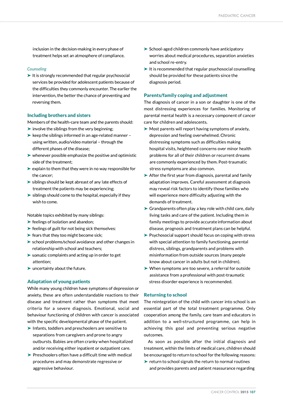
‰ School-aged children commonly have anticipatory
worries about medical procedures, separation anxieties
and school re-entry.
‰ It is recommended that regular psychosocial counselling
should be provided for these patients since the
diagnosis period.
Parents/family coping and adjustment
The diagnosis of cancer in a son or daughter is one of the
most distressing experiences for families. Monitoring of
parental mental health is a necessary component of cancer
care for children and adolescents.
‰ Most parents will report having symptoms of anxiety,
depression and feeling overwhelmed. Chronic
distressing symptoms such as difficulties making
hospital visits, heightened concerns over minor health
problems for all of their children or recurrent dreams
are commonly experienced by them. Post-traumatic
stress symptoms are also common.
‰ After the first year from diagnosis, parental and family
adaptation improves. Careful assessment at diagnosis
may reveal risk factors to identify those families who
will experience more difficulty adjusting with the
demands of treatment.
‰ Grandparents often play a key role with child care, daily
living tasks and care of the patient. Including them in
family meetings to provide accurate information about
disease, prognosis and treatment plans can be helpful.
‰ Psychosocial support should focus on coping with stress
with special attention to family functioning, parental
distress, siblings, grandparents and problems with
misinformation from outside sources (many people
know about cancer in adults but not in children).
‰ When symptoms are too severe, a referral for outside
assistance from a professional with post-traumatic
stress disorder experience is recommended.
Returning to school
The reintegration of the child with cancer into school is an
essential part of the total treatment programme. Only
cooperation among the family, care team and educators in
addition to a well-structured programme, can help in
achieving this goal and preventing serious negative
outcomes.
As soon as possible after the initial diagnosis and
treatment, within the limits of medical care, children should
be encouraged to return to school for the following reasons:
‰ return to school signals the return to normal routines
and provides parents and patient reassurance regarding
PAEDIATRIC CANCER
CANCER CONTROL 2015 107
inclusion in the decision-making in every phase of
treatment helps set an atmosphere of compliance.
Counseling
‰ It is strongly recommended that regular psychosocial
services be provided for adolescent patients because of
the difficulties they commonly encounter. The earlier the
intervention, the better the chance of preventing and
reversing them.
Including brothers and sisters
Members of the health-care team and the parents should:
‰ involve the siblings from the very beginning;
‰ keep the siblings informed in an age-related manner -
using written, audio/video material - through the
different phases of the disease;
‰ whenever possible emphasize the positive and optimistic
side of the treatment;
‰ explain to them that they were in no way responsible for
the cancer;
‰ siblings should be kept abreast of any late effects of
treatment the patients may be experiencing;
‰ siblings should come to the hospital, especially if they
wish to come.
Notable topics exhibited by many siblings:
‰ feelings of isolation and abandon;
‰ feelings of guilt for not being sick themselves:
‰ fears that they too might become sick;
‰ school problems/school avoidance and other changes in
relationship with school and teachers;
‰ somatic complaints and acting up in order to get
attention;
‰ uncertainty about the future.
Adaptation of young patients
While many young children have symptoms of depression or
anxiety, these are often understandable reactions to their
disease and treatment rather than symptoms that meet
criteria for a severe diagnosis. Emotional, social and
behaviour functioning of children with cancer is associated
with the specific developmental phase of the patient.
‰ Infants, toddlers and preschoolers are sensitive to
separations from caregivers and prone to angry
outbursts. Babies are often cranky when hospitalized
and/or receiving either inpatient or outpatient care.
‰ Preschoolers often have a difficult time with medical
procedures and may demonstrate regressive or
aggressive behaviour.